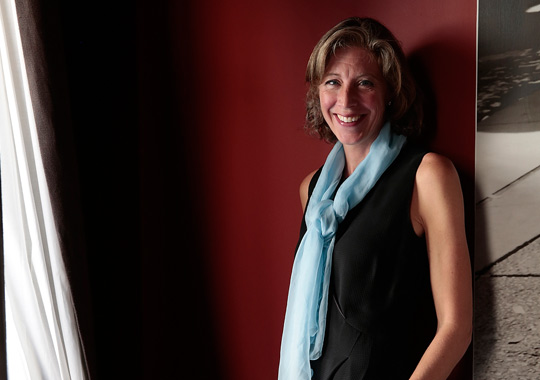Learning About the Next Big Thing
Vanessa Colella has moved from education to venture capital, but teaching remains at the heart of her work
Vanessa Colella (M.A. '96) has moved from education to venture capital, but teaching is at the heart of her work.
In the early 1990s, Vanessa Colella was teaching biology and chemistry in a Manhattan junior high school when video disks hit the retail market. “I was always walking around with 500 slides of different plants, animals and cells, so I thought a single record-sized piece of equipment that could store all these images was just a giant step forward in education,” recalls Colella (M.A. ’96). Soon she began thinking more broadly about how technology could help students to better understand large, complex systems such as the relationship between individuals’ behavior and the spread of HIV/AIDS.
Today, Colella serves as Managing Director and Global Head of Venture Investing for Citi Ventures, an arm of the multinational bank that aims to drive innovation across Citi’s businesses. She operates in the high-stakes world of Silicon Valley, yet still draws on skills honed during her five years of teaching in East Los Angeles, Brooklyn and Manhattan. “People will say, ‘How did you manage that meeting, it’s a really complex dynamic,’ and I’m thinking, ‘You’ve never taught 42 seventh-graders, have you?” She laughs. “Believe me, kids can be a lot less forgiving than grown-ups.”
In morphing into one of the nation’s most influential corporate funders of innovative start-ups, Colella has continued to embrace the idea of lifelong learning and discovery.
“It’s evident that Vanessa has been a teacher,” says Maja Lapcevic, Senior Vice President at Citi Ventures in New York. “She breaks down complex issues by drawing from her own experiences or sharing an example to get her point across.”
In particular, in a career that has included work with the consulting firm McKinsey, a senior vice presidency at Yahoo! and a stint as entrepreneur-in-residence at U.S. Venture Partners, Colella has sought to break down barriers between technology and fields such as business, communications and teaching.
“I draw upon the really foundational experience of teaching all the time,” she says. “My general philosophy is that none of us were born knowing how to do anything that we’ve done — so I really enjoy helping myself and others learn about the next new thing and the opportunities and challenges it presents.”
At Citi Ventures, Colella is hoping to show the financial sector how a global banking conglomerate with roughly a quarter-million employees can absorb the mindset and culture of more nimble tech-oriented startups that are redefining business success in the 21st century. The unit’s mission, hatched in the darkest days after the 2008 financial crisis, is to find, finance and partner with up-and-coming innovators developing products that could ultimately provide an edge to Citi in areas such as commerce and payments, security, big data and financial technology.
“I like to say that in some ways my job is drawing the world’s most simple Venn diagram, illustrating the challenges and opportunities that Citi faces and what entrepreneurs are trying to tackle,” Colella explains. “The kind of companies we look for simply sit at the intersection of those two spaces.”
Colella earned her undergraduate degree in biology from the Massachusetts Institute of Technology and taught science in disadvantaged communities for Teach for America before a stretch teaching biology at Manhattan’s Dwight School. She recalls the early 1990s as a time of “explosion” in technology that nevertheless was slow in reaching the classroom.
Prompted by a sense of unrealized possibility — and inspired by her mother, an artist who returned to school to earn a degree in computer science — she came to Teachers College in 1995 to earn her master’s in education technology. Her mentor was Robbie McClintock, now Professor Emeritus, whose wiring of Manhattan’s Dalton School sparked a Time magazine cover story, and whose protégés at TC’s Institute for Learning Technologies now include some of the biggest names in education technology. It was the dawn of the Internet age, before the advent of the Netscape browser, and Colella recalls using the now-primitive protocol called Gopher to access the World Wide Web. But experimentation was very much in the air.
“Robbie’s attitude was basically, ‘Let’s go see if we can figure something out,’” she recalls. “It might not be the grand answer, but it will be another step toward changing education.”
At TC, Colella worked on a variety of projects, including an online tool called the Discovery Web and a collaboration with the Environmental Defense Fund to connect schools in upper Manhattan to the Internet. She eventually returned to MIT to earn her Ph.D. from the school’s famed Media Lab and wound up co-authoring a book on a technique for modeling complex systems, from diseases to traffic jams.
Colella joined Citi in 2010 as head of North American marketing. She promptly banished the thinking that “digital” should be siloed to any one area of a business.
“Technology is completely pervasive, so digital should simply be embedded in everything the organization does,” she says.
More broadly, she argues, “being able to participate in a meaningful way in discussions about technology is not just for people who want to be computer scientists. The people who are defining technology are the ones who understand the impact that these tools have on our communities and the way we learn and interact. That’s a big change, and it’s a good one.”
Integration — specifically, finding the sweet spot where out of- the-box new technologies can help grow a bank that’s been around for 203 years — is also the mantra at Citi Ventures, which Colella joined in 2013.
“Vanessa is strategic and she is bold,” says Arvind Purushotham, Managing Director at Citi Ventures in Palo Alto. “As she took leadership of the venture investing group, she immediately understood our direction and was quick to make decisions to focus our priorities and enhance our impact across Citi.”
Throughout the past year, the unit has invested in nine startups, including participation in a $32 million round of funding for Betterment, an automated investing service, and a $21 million round for Persado Inc., which uses intelligent software to craft more effective email pitches to consumers. Citi has already seen success with Persado in marketing its credit cards.
“Persado has parsed languages with some fairly complex algorithms to help companies like Citi figure out what’s really the best way to speak to a consumer,” Colella says, adding that Citi Ventures meets with hundreds of companies each year to find “disruptive” technologies that will give its parent firm an edge.
Citi Ventures is innovating on another level as well. In the boys club that has been Silicon Valley, most of the unit’s leaders — including CEO Deborah Hopkins — are female. Having navigated the predominantly male MIT campus of the late 1980s, Colella says the sexism in the industry hasn’t preoccupied her. “Frankly, I just sort of worked through a lot of stuff.”
As Colella journeys deeper into a world of tech-oriented business solutions, she’s watched as the revolution in tech-centered learning continues to flourish at Teachers College. She’s particularly impressed by the College’s growing concentration of expertise in the field of educational data mining and the potential TC’s work holds for creating better, more personalized teaching. She believes TC is uniquely equipped to enhance the digital revolution in learning by marrying its rich traditions and history with its new cutting-edge approaches.
“Technology works best in the service of a deeper understanding of people and problems — and that’s the knowledge TC has created throughout its history,” she says.
Conversely, she hopes TC will collaborate with more outside innovators to solve longstanding classroom problems.
“That can really change your mindset about what’s possible or how something might be solved,” she says.
Like Citi, TC is an iconic, tradition-rich institution — and Colella, who spends her work days looking for untapped potential, is excited by the possibilities for what it can accomplish: “The country needs an institution like TC to pick a really big project and come at it with everything that they’ve got.” —Will Bunch
(Published 5/12/2015)
Published Tuesday, May. 12, 2015

